When Maria Yoon learned that three men in China had killed two mentally disabled women to sell as brides, she was all the more determined to get married again. It would be her 53rd time doing so.
But fate intervened and she wound up in Taiwan ready to tie the knot with a dead husband.
And though both countries share the concept of appeasing dead relatives, Yoon learned that Taiwan’s practice is strikingly different than China’s — at least nobody is killed to become an unmarried dead man’s bride in the afterlife.
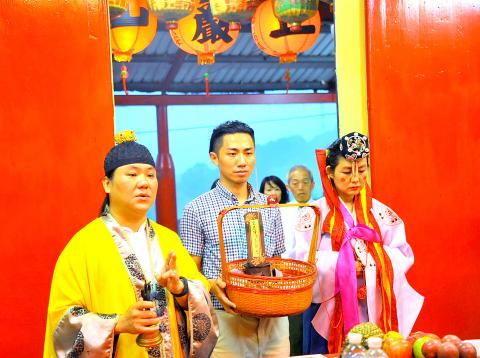
Photo: Han Cheung, Taipei Times
Intrigued, the Korean-American decided to visit both countries. She has “wed” men, women, animals and inanimate objects. Now she would be marrying two ghosts. The following details her experiences at Yunshan Temple (雲山巖) in New Taipei City’s Sijhih District (汐止).
THE GODS SAY NO
Yoon, also known as Maria the Korean Bride, is a performance artist who has had 52 wedding ceremonies in 52 US states and territories in response to familial pressure to wed.
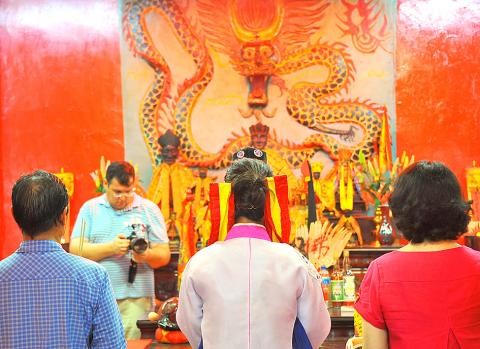
Photo: Han Cheung, Taipei Times
The task to find Yoon a ghost fell to expat filmmaker Tobie Openshaw and Katy Hung (洪惠文), who is familiar with Taoist practitioners through her research on Taiwanese banquet cuisine.
Yoon insisted on finding a corpse despite people telling her that its ghost might follow her for the rest of her life and, if malevolent, might even kill her.
Yoon takes it all in stride.
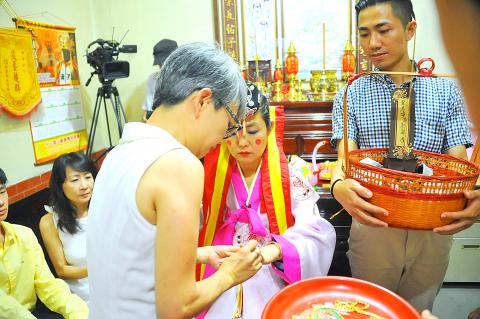
Photo: Han Cheung, Taipei Times
“If it’s my time, then I’ll go.”
Openshaw and Hung did find a dead person — the deceased brother of a Taoist priest’s wife — but the priest cast divination blocks three times and the deity said no each time. He tried another temple, but with the same result. They then decided to make do with a invented ghost at Yunshan Temple.
The priest’s services cost about NT$30,000 — the first time Yoon has had to pay for any of her 53 wedding.
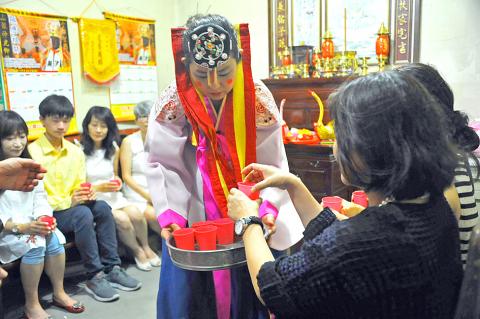
Photo: Han Cheung, Taipei Times
To show her respect for the ritual, Yoon bought jewelry, props and took cooking classes to learn how to make pineapple cake and other sweets for the guests.
MARRYING THE DEAD
On Saturday, she married Howard Chen (陳豪爾), a name Yoon invented. Her experiences will be made into a documentary as she continues to explore the institution of marriage.

Photo: Han Cheung, Taipei Times
“The societal pressure on women to marry continues after death,” she says.
Ghost marriages in Taiwan mostly involve men marrying female ghosts, since unmarried women are not included on a husband’s family registry and have no descendants to take care of her spirit in the afterlife. The woman’s family finds her a groom so her spirit can be at peace.
Yoon says she was fascinated by how ghost marriages brought comfort to the dead person’s living relatives, knowing that she would rest in peace.
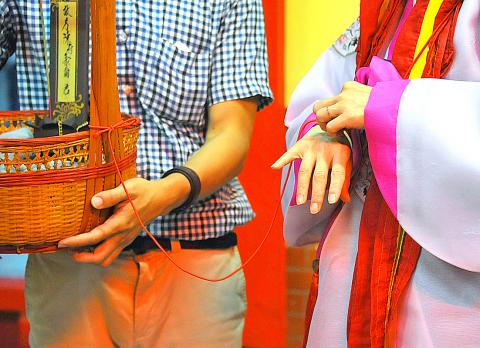
Photo: Han Cheung, Taipei Times
“Love still matters after you are dead,” she says.
The Taoist priest who conducted the wedding, Wang Wen-cheng (王文正), says that women rarely marry male ghosts since they are not allowed to marry a living man later.
“[Yoon] is marrying a fake person, so it doesn’t matter in this case,” he says.
Wang says that ghost marriages were once common in northern Taiwan, but not so much anymore. He last performed a ghost wedding five years ago for a couple involved in a car accident. The man, who was paralyzed from the waist down, married his dead girlfriend.
“Times are changing, and as people’s general knowledge increases, they can no longer accept these old traditions,” he says, adding that the influx of foreign religions has also made people wary of such practices.
Wang has long wanted to film the ritual, but his clients have denied him permission because they see it as a private affair. He says he’s grateful for this chance to record the ceremony since he doesn’t know when will be his next time.
The rite is very similar to a wedding for the living, Wang says, except that it is less festive with fewer guests. In a proper ceremony, a rooster represents the groom, but since Yoon was unable to procure one, they replaced it with a memorial tablet. This is acceptable only because it is a performance, Wang says.
FAMILY OF STRANGERS
Yoon is having a “bridezilla moment” midway through the ceremony. She had picked four people to represent Chen’s family, but she was just told that four is an unlucky number, so she has to add two more. Her matchmaker tries to recruit for her, but she insists on taking control and picking them herself so she can choose people she feels connected to.
“For the five minutes I’ve known them,” she quips.
In fact, aside from her “mother,” Yoon met all “family members” on both sides for the first time right before the ceremony.
The “relatives” are mostly provided by Tao I-wei (陶一葦), a Taiwanese friend of Yoon’s who flew in from New York after hearing about the project. Tao reached out to her former colleagues and friends, and although many of them declined because of their fear of ghosts, six agreed to help.
As per her previous weddings, Yoon completes the entire ceremony in her pink hanbok, a Korean dress worn on formal occasions. She serves tea to family members, who help her put on jewelry, while a gold chain is put around the tablet, held by Tsou Tsung-han (鄒宗翰), who Yoon recruited after they met in Taipei.
They later move to the main altar, where Wang rings a bell while singing. With a red string connecting Yoon’s wrist to the tablet, the two bow three times while holding incense. The deal is sealed when the wedding certificates are stamped.
FEAR OF THE DEAD
Su Jui-jung (蘇瑞榮), the temple’s director, sees no issue with using the ceremony for performance art.
“It’s fate that brought us together,” he says, adding that they obtained permission from the temple’s deity. “There’s no taboo. It’s just a documentary.”
But many Taiwanese are wary of attending these events, as evidenced by the spectators all being foreigners. The only locals present were some of the film crew, temple personnel and the family members.
Tsou says he was surprised when his friends declined his invitation to the ceremony. Even though he told them it was an imitation of the ritual and without the presence of the ghost, they were unwilling to take the risk.
Tao adds that she didn’t take ghost marriages seriously until she learned that an aunt who died young was posthumously married. She saw it as an opportunity to learn more about her culture.
“It’s a tradition that we heard about as kids, but it’s a taboo that nobody really wants to talk about or experience,” she says.
Even so, Wang still took precautions, changing Yoon’s birth date and ritually cleansing the film crew with incense smoke.
MOVED TO TEARS
After about three hours and many rehearsals and retakes, the ceremony is finally over. Yoon is exhausted.
“It was very moving,” she says. “When it was time for the marriage certificate, I was ready to cry.”
Tsou says he began to feel that Chen is his real brother. He adds that he felt elated for the fictitious spirit as the marriage was sealed.
“It was a bizarre feeling,” Yoon says. “I feel we had a special connection just at that moment there.”
Yoon laments that such a sacred and beautiful ceremony is dying out.
“Regardless if you believe in ghosts or not, if it brings comfort to the living and the family, they should keep it,” she says. “I think it’s sad that modern society has gone away from it out of complete fear. I’m glad I was persistent and not afraid of following through.”
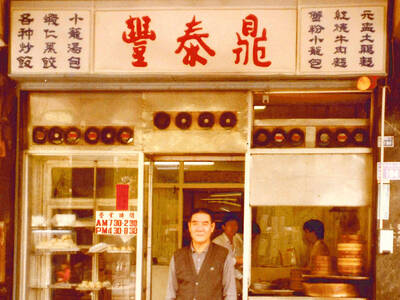
March 24 to March 30 When Yang Bing-yi (楊秉彝) needed a name for his new cooking oil shop in 1958, he first thought of honoring his previous employer, Heng Tai Fung (恆泰豐). The owner, Wang Yi-fu (王伊夫), had taken care of him over the previous 10 years, shortly after the native of Shanxi Province arrived in Taiwan in 1948 as a penniless 21 year old. His oil supplier was called Din Mei (鼎美), so he simply combined the names. Over the next decade, Yang and his wife Lai Pen-mei (賴盆妹) built up a booming business delivering oil to shops and
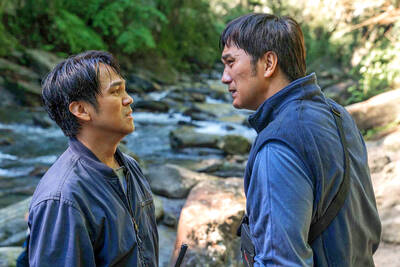
Indigenous Truku doctor Yuci (Bokeh Kosang), who resents his father for forcing him to learn their traditional way of life, clashes head to head in this film with his younger brother Siring (Umin Boya), who just wants to live off the land like his ancestors did. Hunter Brothers (獵人兄弟) opens with Yuci as the man of the hour as the village celebrates him getting into medical school, but then his father (Nolay Piho) wakes the brothers up in the middle of the night to go hunting. Siring is eager, but Yuci isn’t. Their mother (Ibix Buyang) begs her husband to let

The Taipei Times last week reported that the Control Yuan said it had been “left with no choice” but to ask the Constitutional Court to rule on the constitutionality of the central government budget, which left it without a budget. Lost in the outrage over the cuts to defense and to the Constitutional Court were the cuts to the Control Yuan, whose operating budget was slashed by 96 percent. It is unable even to pay its utility bills, and in the press conference it convened on the issue, said that its department directors were paying out of pocket for gasoline
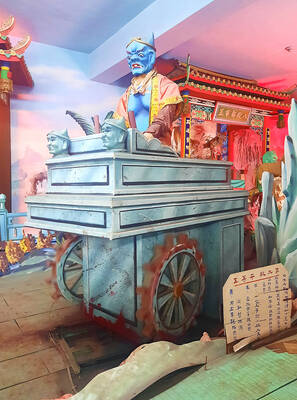
For the past century, Changhua has existed in Taichung’s shadow. These days, Changhua City has a population of 223,000, compared to well over two million for the urban core of Taichung. For most of the 1684-1895 period, when Taiwan belonged to the Qing Empire, the position was reversed. Changhua County covered much of what’s now Taichung and even part of modern-day Miaoli County. This prominence is why the county seat has one of Taiwan’s most impressive Confucius temples (founded in 1726) and appeals strongly to history enthusiasts. This article looks at a trio of shrines in Changhua City that few sightseers visit.